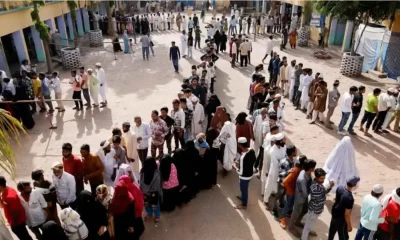Latest business news
Amazon picks up Whole Foods chain for $13.7 bn: an example for Indian e-retailers?

[vc_row][vc_column][vc_column_text]The e-retailing pioneer that took shopping to the virtual world is back to selling the old-fashioned way, with its $13.7 billion takeover of Whole Foods Market, the first “Certified Organic” grocer in the US operating a mid-sized grocery and foods chain based in Austin, Texas.
The takeover will not change Whole Foods much. Co-founder and CEO John Mackey stays on as CEO. The brand, too, will remain intact.
The move created more than a minor flutter. Feeling threatened, Wal-Mart Stores Inc said on Friday it would buy online men’s fashion retailer Bonobos Inc for $310 million, in its fourth e-commerce deal in under a year, seeking to bridge the gap with e-commerce leader Amazon.com Inc.
Reuters reported that Amazon’s deal to buy Whole Foods comes as Wal-Mart is engaged in a price war with rivals such as Aldi and Kroger in the grocery segment, which makes up about 56 percent of Wal-Mart’s revenue. Quoting Ken Perkins, president of research firm Retail Metrics, it said Amazon’s move only adds to the pressure on Wal-Mart, as over time, the convenience and grocery delivery offered by the e-commerce giant would likely cut into Wal-Mart’s sales.
The urgency of Amazon to go in for the all-cash deal ($42 per share of Whole Foods stock) highlighted Amazon chief Jeff Bezos’ desire to stay on the ball and in keep pace with the competition. The deal will complete in the second half of 2017, subject to stakeholders’ and regulatory approval.
Mackey saw the merger as a win-win for all, saying in a joint statement: “This partnership presents an opportunity to maximize value for Whole Foods Market’s shareholders, while at the same time extending our mission and bringing the highest quality, experience, convenience, and innovation to our customers.”
Bezos promised a hands-off approach, saying: “Millions of people love Whole Foods Market because they offer the best natural and organic foods, and they make it fun to eat healthy. Whole Foods Market has been satisfying, delighting and nourishing customers for nearly four decades — they’re doing an amazing job and we want that to continue.”
Whole Foods, with over 460 stores in the US, Canada and the UK, had revenues of $16 billion in fiscal 2016.
The move by Amazon could perhaps be an example for Indian e-retailers such as Flipkart. Indians are in the habit of first “handling” goods they wish to buy. Physical storefronts will encourage them to make purchases with the discounts they can avail of online.
The only problem could be the old one – of overheads. What Amazon has tried to do in keeping Whole Foods as a separate unit is to cash in on the successful business model of the company and add e-outlets for further expediency in sales.[/vc_column_text][/vc_column][/vc_row]
Latest business news
Google restores delisted Indian apps after government intervention
Google on Saturday restored all Indian apps it had removed.

Google has started to restore all the delisted Indian mobile apps on Play Store agian, which they had removed due to a disagreement over service fees. After a discussion between company representatives and IT Minister Ashwini Vaishnaw, the decision was made, according to sources.
The step was taken in response to Vaishnaw’s strong statement in which he said that it is not allowed for apps to be removed from the Google Play Store. The minister had said, India is very clear, our policy is very clear…our startups will get the protection that they need.
Vaishnaw continued saying that he has already given Google a call. They will be speaking with the app developers who were delisted this week. This is not acceptable. The minister said this kind of delisting cannot be permitted.
Ten Indian companies’ apps were banned by Google on Friday, causing outrage in one of its fastest-growing markets. With 94% of phones running on its Android platform, Google holds a large portion of the Indian market. Popular names like Naukri and Bharatmatrimony were on the list.
The main point of contention is Google’s in-app purchase fees, which range from 11% to 26%. Indian startups have long opposed the US tech giant’s actions, believing them to be unfair.
The founder of Bharat Matrimony, Christian Matrimony, Muslim Matrimony, and Jodii, Matrimony.com, expressed shock at the matchmaking apps’ removal from the Google Play Store.
Shaadi. Com CEO Anupam Mittal described it as a dark day for India’s internet, highlighting the possible broad effects on matchmaking services. He also called Google an evil.
While, Kuku FM Co-founder Vinod Kumar Meena in a statement had said that Google was behaving like a monopoly.
Meanwhile, Google temporarily withdrew the famous Indian payments app Paytm from the Play Store in 2020, claiming a few policy infractions. Due to this decision, the founder of the company as well as the larger startup community came together to build their own app stores and file lawsuits against Google.
Latest business news
Anant Ambani says he is 100% lucky to get Radhika Merchant in his life
Anant Ambani said he was grateful to get Radhika as his life partner. He said he is 100% lucky to get Radhika Merchant in his life. He said every day he is falling more and more in love with her. He added although he had known Radhika for the last 7 years, it felt he had met her only yesterday. He thanked Radhika for everything.

Anant Ambani and Radhika Merchant’s grand three-day wedding celebrations began with a glamorous cocktail night on Friday in Jamnagar. During the celebrations, Anant Ambani also gave a speech wherein he thanked his late grandfather Dhirubhai Ambani and grandmother Kokilaben Ambani for inspiring him. Anant Ambani said he was grateful to get Radhika as his life partner. He said he is 100% lucky to get Radhika Merchant in his life. He said every day he is falling more and more in love with her.
He expressed his gratitude to his mother for pulling together the lavish three-day wedding celebrations in Jamnagar. Anant thanked his mother for all she had done. He said all the arrangements had been done by his mother and nobody else. He added his mother had gone all out and she had worked 18-19 hours a day and he was extremely grateful to her.
He also thanked all the guests who were present there at the pre-wedding celebrations. He said everyone had made it to Jamnagar to make him and Radhika feel special. He said both of them were honored and humbled to have all of them present there. Anant said he was sorry if they had caused an inconvenience to anyone. He asked for forgiveness. He hoped everyone is going to enjoy the coming three days. He also thanked his mother, father, sister, brother, his sister-law and his brother in-law for making this event memorable.
Anant said everyone has been sleeping for less than 3 hours a day for the last 2-3 months and he was very happy to share this joy with everyone. The youngest Ambani talked about his personal struggles and how his parents had always supported him. He further added his life had not been entirely a bed of roses. He said he had also experienced the pain of thorns. He said he had faced many health crises.
Latest business news
Facebook chief Mark Zuckerberg shares pictures from 2nd day of Anant Ambani and Radhika Merchant pre-wedding celebrations
Zuckerberg shared pictures from the 2nd day of Anant Ambani and Radhika Merchant’s pre-wedding celebrations. In the photograph Mark Zuckerberg can be seen along with his wife Priscilla Chan. The couple is exuding happiness as they prepare for the event. He captioned the picture it is getting wild out here.

Facebook boss Mark Zuckerberg and wife Priscilla Chan joined the star- studded pre-wedding celebrations of Anant Ambani and Radhika Merchant in Jamnagar on Friday. The event was attended by many prominent figures from different fields. Zuckerberg took to his Instagram handle congratulated the couple and said he loved Indian weddings.
Zuckerberg shared pictures from the 2nd day of Anant Ambani and Radhika Merchant’s pre-wedding celebrations. In the photograph Mark Zuckerberg can be seen along with his wife Priscilla Chan. The couple is exuding happiness as they prepare for the event. He captioned the picture it is getting wild out here.
The theme of the opening day of the pre-wedding celebrations was Evening in Everland as the guests wore cocktail attire. The first day of the grand celebrations elevated the expectations of the guests for the following days. The theme of the 2nd day of the pre-wedding bash is known as a Walk on the Wildside and the guests can be seen in Jungle Fever attire.
Zuckerberg has opted for an animal print shirt with white trousers, Chan is complementing his look in a strappy one piece in black and golden. The Jungle theme is aligned to Vantara, Reliance’s animal welfare initiative undertaken and launched by Anant Ambani a few days back.
International pop star Rihana electrified the pre wedding celebrations on Friday with an amazing performance, marking her debut appearance in India. The chart topping artist engaged the audience with performances of her iconic hits which included Pour it Up, Work and Diamonds.
Zuckerberg graced the opening day, wearing a black-on-black firefly blazer and shoes from Alexander McQueen while his wife Priscilla wore a black gown with gold flower details and other accessories such as dainty chain bracelet, gold necklace and stud earrings. Mark Zuckerberg and wife Priscilla Chan are one of the Power couples invited from the global business community for the festivities currently underway at Jamnagar.
-

 Entertainment19 hours ago
Entertainment19 hours agoDo Aur Do Pyaar social media review: Social media users say Vidya Balan, Pratik Gandhi deliver standout performances in this adorable film
-

 2024 Lok Sabha Elections20 hours ago
2024 Lok Sabha Elections20 hours agoLok Sabha elections 2024: Amit Shah files nomination from Gandhinagar
-

 Entertainment21 hours ago
Entertainment21 hours agoYami Gautam starrer Article 370 releases on Netflix today
-

 2024 Lok Sabha Elections22 hours ago
2024 Lok Sabha Elections22 hours agoKamal Haasan, Rajinikanth, Vijay Sethupathi, Dhanush vote in Chennai
-

 2024 Lok Sabha Elections16 hours ago
2024 Lok Sabha Elections16 hours agoDeserted by key supporters, the Kamal Nath story looks set to wind to an end in Chhindwara
-

 2024 Lok Sabha Elections22 hours ago
2024 Lok Sabha Elections22 hours agoLok Sabha elections 2024: TMC, BJP workers clash in West Bengal’s Cooh Behar ahead of voting
-

 Entertainment18 hours ago
Entertainment18 hours agoAditya Roy Kapur, Sara Ali Khan’s Metro In Dino to release this November
-

 2024 Lok Sabha Elections23 hours ago
2024 Lok Sabha Elections23 hours agoLok Sabha elections 2024: Google Doodle marks the start of polls with index finger voting symbol



















